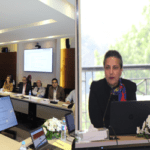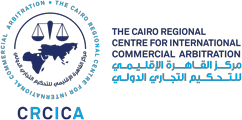
The Distinguished Lawyers Program: “Your Guide to Mastering Client Relationships … the Customers’ Perspective”
Nov 30 2016
The CRCICA and the ABA ROLI jointly organized a career development training entitled “Your Guide to Mastering Client Relationships the Customers’ Perspective”. Delivered by Mr. Ayman Essam, Director of Legal & External Affairs, Vodafone Egypt, the training marked the first event in a sustainable CRCICA/ABA ROLI Continuing Legal Education Scheme.
This training was designed to help lawyers of law firms to know their clients, embrace their needs, fulfill their expectations and thus ensure client loyalty and improve billing and collections process.
The instructor used interactive methods of presentation and thought-provoking quizzes. After the presentation, there was a Q & A session followed by a legal memo “reconstruction” exercise.
The scope of the training included ways to bridge the gap between law firms and clients; lawyers’ “soft skills”; behavioral performance of law firms to meet clients’ emotional needs; the importance of improving industry understanding; best practices for billing; improving service quality: lessons and practice from an insider’s view; client retention strategies and the importance and methods to measure clients’ satisfaction. The training ended by a case Study and practical exercise.
View Details
Expert Witness in International Commercial Arbitration
Oct 24 2016
The Cairo Branch of the Chartered Institute of Arbitrators and the CRCICA co-organized the First Course on “Expert Witness in International Commercial Arbitration” on 24 October 2016, Cairo, Egypt.
The Course was jointly delivered by Mrs. Aisha Nadar, Member of FIDIC Executive Committee (EC) and Senior Consultant, Construction Contracts and Dispute Resolution, Advokatfirman Runeland AB Stockholm, Sweden and Mr. Per Runeland, Senior Counsel, Advokat Setterwalls, Stokcholm, Sweden. It presented a combination of lecture, Q & A and interactive exercises. The masterpiece of the course was a mock cross-examination in which one tutor cross-examined the other in a highly demonstrative manner to present the several different approaches to cross examination, including head-on and collateral attack.
View Details
ABA ROLI Training of Trainers Course 2-3 September 2016
Sep 02 2016
CRCICA hosted and organized the ABA ROLI Training of Trainers Course on 2-3 September 2016.
Delivered by Professor Marcia Levy, Executive Director, Pro Bono Partnership, New York, USA, the Course demonstrated interactive teaching techniques to improve practical advocacy skills for Egyptian Lawyers, as part of the ABA ROLI Continuing Legal Education Program in the MENA Region.
TOT participants will teach basic skills courses for fresh graduates of the Egyptian Schools of Law. More importantly, they will symbolize the core assets of the CRCICA/ABA ROLI CLE Program in Egypt and in other countries of the region as ABA ROLI and CRCICA share ambitious plans to expand Egypt-based courses to neighboring countries in the future.
View Details
FIDIC WORKSHOP Hands-on Experience on using FIDIC Contracts, 17 April 2016
Apr 17 2016
Moderated by Mrs. Aisha Nadar, Consultant at Advokatfirman Runeland AB, and Member, FIDIC Updates Task Group 1999 Suite, the workshop featured five training sessions: Which Contract to Choose and why; drafting and negotiating particular conditions; operation of FIDIC contracts; claims and dispute avoidance and resolution.
Trainees practised two interactive exercises, the first of which took the form of a procurement problem, setting out the contours of the project and having the students identify which forms they would use and why. The second exercise tackled claims, their categorization and the allocation of costs.
The workshop was very well received in the Egyptian marketplace and was attended by more than 50 trainees being lawyers, consulting engineers, developers, judges, contract managers representing a variety of top businesses…etc. It was quite interesting that participants come from Algeria, Bahrain, Egypt, KSA and Sudan.
(Photo Gallry)
View Details
The fifth Annual Training Course on “Comparative Commercial Arbitration, Theory and Practice” (CCATP), equivalent to CIArb Module 2: Law of International Arbitration leading to the Membership of the Chartered Institute of Arbitrators, 20-25 March 2016, Cairo-Egypt
Mar 20 2016
CRCICA and CIArb Cairo launched the training course: “Comparative Commercial Arbitration: Theory and Practice” (CCATP) in 2011, as the first comparative arbitration program in the Arab World with a simultaneous bilateral tutorial methodology that combines Civil Law and Common Law systems. The program covers the main arbitration stages being the arbitration agreement, the arbitral tribunal, the arbitral proceedings and finally the arbitral award. It provides the ideal platform to underpin and support the development of professional experience in arbitration.
In 2016, in response to potential participants’ needs, the program was condensed over 6 successive days, after being delivered in the past in four separate modules, each lasted for 3/4 days.
Reference texts comprised an unprecedented collection of documents including comparative state court decisions of the European (British, French and Swiss), American and Arab (Egyptian, Saudi, Sudanese, Tunisian, Emirati, Iraqi and Syrian) jurisdictions; a unique collection of arbitration arbitral principles extracted from awards of many international arbitration institutions including CRCICA; national laws, model and institutional arbitration rules, international agreements and court judgments, the IBA Guidelines on Conflict of Interest in International Arbitration, the IBA Rules on the Taking of Evidence in International Arbitration, the IBA Guidelines for Drafting International Arbitration Clauses, analytical articles as well as expert commentaries.
The last day of the program was fully devoted to participants’ assessment through a number of mock cases carefully prepared as based on CRCICA accumulative experience over 35 years in the administration of arbitration cases. The assessment day is divided into three exams, each composing of a number of questions and mock cases out of which participants have to define the legal problems and provide their legal opinion based on the course. Participants were also required to draft some procedural decisions and a complete arbitral award.
The course, in its new form, was a real success and was very well received as a unique comparative arbitration course qualifying practitioners to partake in international arbitrations under any jurisdictions.
View Details
